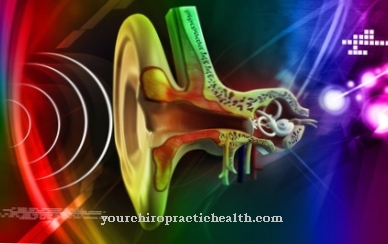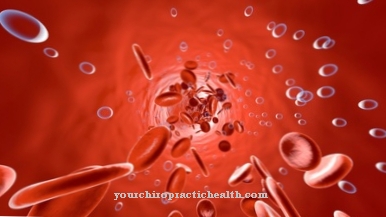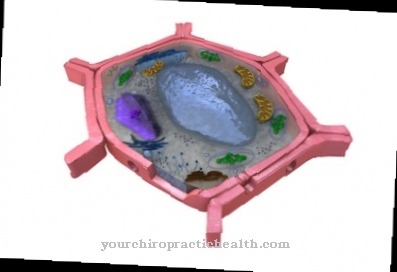In humans and animals, this means Drink the ingestion of a liquid by mouth. It is essential for survival and even more important than solid food.
What is that drink
While drinking, swallowing movements occur with visible movement of the larynx. In addition to water, the body can supply numerous fluids. These include luxury foods such as coffee or alcohol, fruit juices and tea as well as milk, soups or liquid medicines.
After the liquid substance has passed the oral cavity, it passes through the esophagus into the stomach and then into the intestine. The intestinal walls are well supplied with blood. The fluid is absorbed into the blood through the intestinal walls.
The necessary amount of fluid as well as the nutrients and oxygen contained are passed on for processing by other body cells as part of the body's metabolic process. Finally, the residual fluid (without nutrients and with some waste materials) that the body can no longer use is excreted in the kidneys. During this phase, the fluid absorbed through drinking is called urine, which passes through the ureter into the urinary bladder. It is then excreted from the body from there.
Function & task
Drinking is a response to the human feeling of thirst. However, you should ensure that you drink enough fluids every day even if you don't feel thirsty. The functionality of the body, including the mental and emotional state, depends in many ways on adequate fluid intake. In addition to breathing oxygen-containing air, drinking, especially water, is the second most important vital external supply to the human body.
About two liters of water should be consumed daily to compensate for regular water loss and the functionality of the body. Consumption should be even higher in extreme heat, strenuous work or intense sport.
Sufficient water ensures the proper functioning of the body cells. This also keeps the immune system intact. Adequate hydration will thin the blood and lower blood pressure. This reduces the risk of thrombosis. Good blood flow can also transport necessary nutrients and oxygen as needed.
The intensive blood circulation in the brain cells promotes the ability to concentrate and memory and, with the messenger substance serotonin, ensures a good mood. The balanced water balance regulates the balance of acids and alkalis as well as the body temperature. The muscles remain efficient.
If there is sufficient fluid, cellular waste products are also disposed of via the metabolic processes. These include poisons such as uric acid. Drinking also stimulates the digestive process and provides the necessary lubricant in the crevices of the joints. An efficient support function of the connective tissue is also ensured by the fluid supply.
A continuously adequate amount of water to drink ensures sufficient tear fluid to protect the eyes. Even strong bones need enough fluids. Sufficient drinking water every day with a balanced mineral content has an effect on health, vitality and the aging process. For these reasons, drinking water quality should be given high priority in nutrition.
You can find your medication here
➔ Medication for sleep disordersIllnesses & ailments
At birth, humans are made up of around 96 percent water. In adults, this majority is still around 70 percent, which is around 43 liters of water. The body continuously loses fluid through urine and feces, sweating, breathing and tear fluid. In extreme heat and heavy physical exertion, the fluid loss is even more intense.
The considerable importance of hydration through drinking as a balance is already clear from the fact that a person without drinking is in mortal danger after a few days. Therefore, if the person has symptoms of weakness, a glass of water is often offered in a hurry. The first symptoms of deficiency such as thirst, dry mouth or headaches can occur even with a small amount of water loss. Elderly people have circulatory problems, especially on hot days.
Due to the lack of water in the body, the blood becomes thicker. The heart has to work harder to keep the blood circulating freely. This can lead to dizziness, shortness of breath and headaches. It tingles in the legs and arms. The affected person increasingly feels a dry mouth.
If there is insufficient water supply (dehydration), declining cell activities cause a disruption of the physical balance. All organs are affected, even the skin. From weak muscles to kidney failure, all disorders can occur.
The insufficient supply of nutrients causes the brain to function properly as a central control organ. This limits the ability to think and concentrate. The metabolic processes, including the disposal of toxins, are also impaired by the lack of fluids.
The excreted fluids also lead to a loss of minerals and salts, which are no longer adequately replaced if too little fluid is present. Sodium deficiency is particularly problematic, as it can lead to fatigue and, as a result, to dangerous neurological failures. If there is cell dehydration (insufficient water supply), the body accumulates water in a protective reaction to neutralize it against toxins and acids. The accumulations of water can be seen as noticeable thickenings on the legs, feet and arms.
Dangers and damage to health and impaired performance can also result in incorrect or excessive amounts of fluids. Too much alcohol can damage the liver. Cardiac arrhythmias, inflammation of the pancreas or nerve damage can also be triggered.
Sugary drinks can, in the long run and in excess, disturb the balance between healthy and unhealthy intestinal bacteria. They can also cause obesity. Too much caffeinated coffee can in turn lead to palpitations and insomnia. If you drink very cold liquids, you can get stomach and intestinal problems.
So it should be drunk daily in moderation, but sufficiently. Drinks that are too cold and too hot should be consumed carefully and water cannot be dispensed with. Responsible use of drinking water takes account of the importance of this livelihood.
























.jpg)



